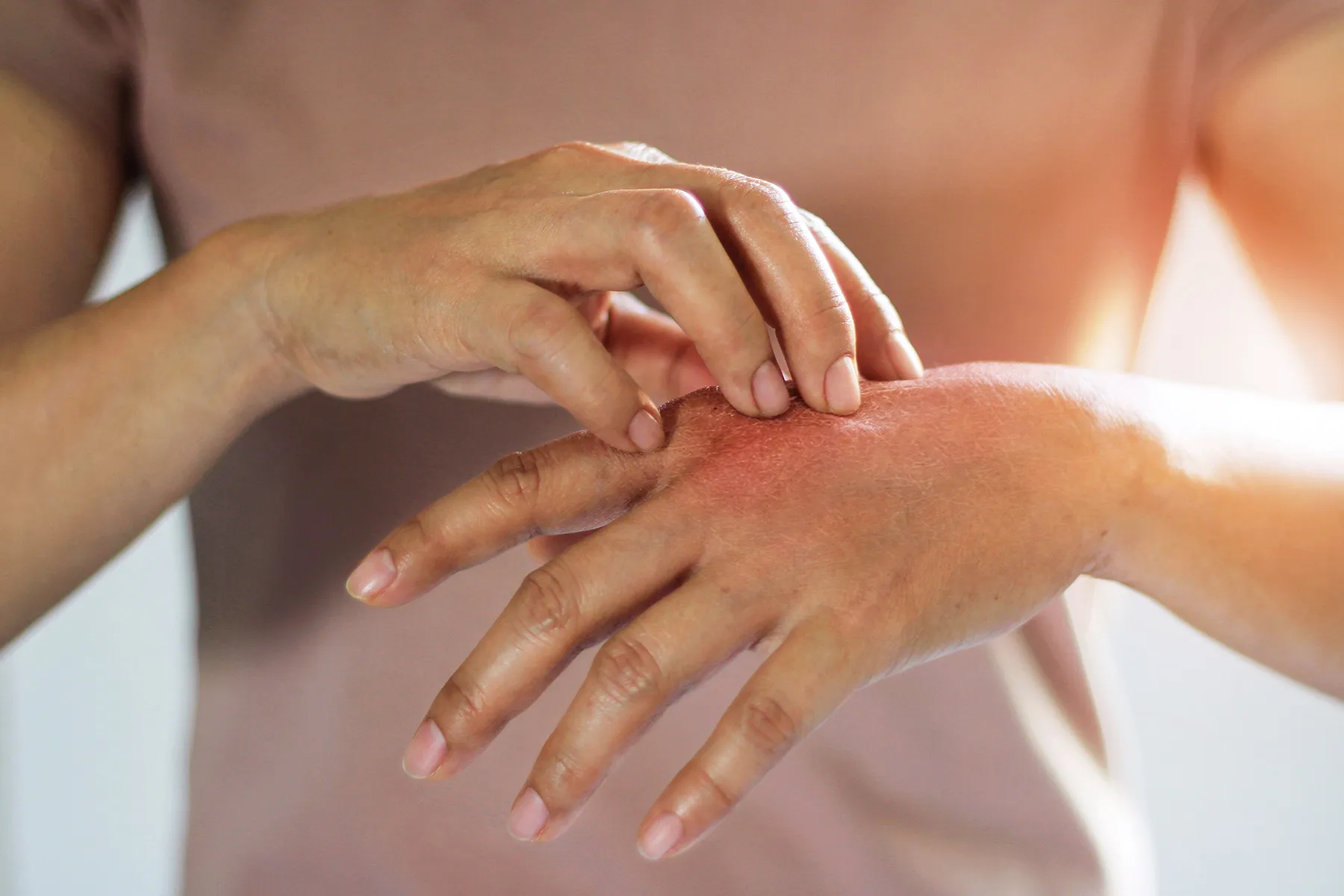
Dec. 26, 2023 – “Eczema is my constant winter companion,” said Ali Zagat, 42, of Philadelphia. Once cold weather arrives, so do dry, red patches on her hands and painful cracks on her knuckles and fingertips. “I have sensitive skin and eczema in general, but when the air is dryer and it’s cold outside, it gets worse.”
There are clear reasons for this, said Julia Tzu, MD, a clinical assistant professor in the Department of Dermatology at New York University School of Medicine. “Our skin is constantly fluctuating with the environment. During wintertime in the Northern Hemisphere, the humidity drops sharply and the temperature goes down — it’s (an extreme drying) condition, so your skin is losing lots of water.”
All Kinds of Trouble
Zagat’s experience isn’t unusual — research has found that as the temperature dips, eczema patients seek treatment more often. And people who live in cold climates are much more likely to have it than those who live in warmer areas. More than 31 million Americans have eczema, also known as atopic dermatitis, in some form.
Other skin conditions tend to flare up in winter, too. Cold and wind can trigger the redness of rosacea, for instance. And seborrheic dermatitis, a scaly rash (called dandruff when it’s on your scalp), gets worse with cold. In one study of several thousand people with psoriasis, more than half had more trouble in colder months.
Amy Kelly, 44, lives on a farm on Vancouver Island, British Columbia. She’s had psoriasis since childhood and knows to expect the worst when the weather turns frosty.
“At its worst, my psoriasis gets so itchy, I wind up compulsively scratching to the point where it bleeds,” she said. “And when scratching breaks the skin, it stings, too.”
All these issues share a similar root: Winter wreaks havoc with your skin barrier.
“The skin barrier is essentially a fortress that seals your body,” Tzu said. As the top layer of your epidermis, the barrier includes waxy ceramides, cholesterol, and fatty acids, which help to seal in moisture and keep out environmental irritants. When the surrounding air is extremely dry, as often happens in winter, it can strip the skin barrier’s natural moisture.
What Makes It Worse?
Unfortunately, some of the things we do in response to winter weather can trigger more problems:
Skin care products themselves are often a culprit. A lot of anti-aging products can be too harsh for winter skin.
“Generally avoid anything irritating,” Tzu says. “If you’re using a retinoid in summertime, cut the frequency in winter. Avoid or cut down on products with ingredients like vitamin C, glycolic acid, beta hydroxy or alpha hydroxy acids, and retinols, or even physical exfoliation.”
And it’s not just the active ingredients that can cause trouble. For many people, fragrance leads to flare-ups.
“It might smell good, it might feel good, but avoid fragrance, natural or not,” said Shilpi Khetarpal, MD, a dermatologist at the Cleveland Clinic. “Poison ivy is natural, and look what it does to our skin.”
What Makes It Better?
Once your skin is dry and flaky, it’s a short hop to itchy and burning. Here’s what you can do to relieve the discomfort:
Don’t wait too long to seek help if your skin is making you uncomfortable. “If it’s just your skin, with no obvious rash, nothing else you’ve noticed, try moisturizing for a week,” Tzu said. “If it doesn’t go away, see a dermatologist.”
Stop Trouble Before It Starts
Even if you’ve never had problem skin in winter, issues can crop up. A few preventive measures can help you avoid discomfort in the first place:
Whether you’re trying to heal your skin or keep it healthy, it makes sense to take a multi-pronged approach. Amy Kelly, who has psoriasis, leaps into action as soon as the temperature begins to drop. In addition to covering up when she goes outside, she takes a vitamin D supplement and drinks plenty of water. “I also watch my sugar, alcohol, and stress — all those things combined make it worse,” she said. “If I can take other stressors out, the cold doesn’t have that much of an impact.”
24World Media does not take any responsibility of the information you see on this page. The content this page contains is from independent third-party content provider. If you have any concerns regarding the content, please free to write us here: contact@24worldmedia.com